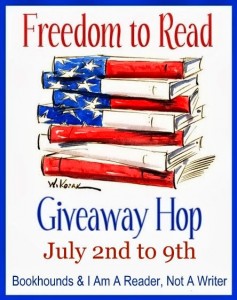 Welcome to my blog! The week of 2 July – 9 July, I’m participating with more than one hundred other bloggers in the “Freedom to Read” giveaway hop, accessed by clicking on the logo at the left. All blogs listed in this hop offer book-related giveaways, and we’re all linked, so you can easily hop from one giveaway to another. But here on my blog, I’m posting a week of Relevant History essays, each one focused on some facet of the American War of Independence. To find out how to qualify for the giveaways on my blog, read through each day’s Relevant History post below and follow the directions. Then click on the Freedom Hop logo so you can move along to another blog. Enjoy!
Welcome to my blog! The week of 2 July – 9 July, I’m participating with more than one hundred other bloggers in the “Freedom to Read” giveaway hop, accessed by clicking on the logo at the left. All blogs listed in this hop offer book-related giveaways, and we’re all linked, so you can easily hop from one giveaway to another. But here on my blog, I’m posting a week of Relevant History essays, each one focused on some facet of the American War of Independence. To find out how to qualify for the giveaways on my blog, read through each day’s Relevant History post below and follow the directions. Then click on the Freedom Hop logo so you can move along to another blog. Enjoy!
*****
For two centuries, a number of myths have circulated about certain aspects of the American War of Independence. Other historians and I have debunked some of those myths in our writings. One worth examining for 21st-century Americans is the myth that the civilian population during the Revolution was made of zealous Protestants. You can see an example of that myth in the historically inaccurate movie “The Patriot,” with its imagery of an overly enthusiastic young woman recruiting men from a Protestant congregation into joining a militia against the redcoats.
Firebrand Protestants could definitely be found during the war. Britons sometimes referred to the American War as the “Presbyterian War.” But although a good number of people of the thirteen colonies and surrounding territories were Christians, they weren’t all Presbyterians or even Protestants. And the residents of America certainly weren’t all Christian.
Christianity in America during the Revolution
In Revolutionary America, Christianity was splintered into diverse sects that weren’t on the same page about how their faith should be interpreted and expressed. Probably the largest and most influential sects were Anglicans, Congregationalists, and Presbyterians. In addition, there were groups of Puritans, Dutch Reformed, Quakers, Lutherans, Baptists, Anabaptists, Mennonites, Amish, Eastern Orthodox, and English Roman Catholics. There were likely also groups of French Huguenots and Spanish, Portuguese, and Italian Catholics. Thus Christianity in Revolutionary America was by no means a unified religion.
Founding Fathers
Most of America’s founding fathers were Christian, but the religious persuasions of a few elude definition. “Deism” has been the label ascribed to the religious preferences of certain of America’s prominent founding fathers. In his book The Religious Beliefs of America’s Founders: Reason, Revelation, and Revolution, historian Gregg L. Frazer makes the case that John Adams, Thomas Jefferson, Benjamin Franklin, Alexander Hamilton, George Washington, and several others were actually theistic rationalists—neither deists nor Christians.
Jews
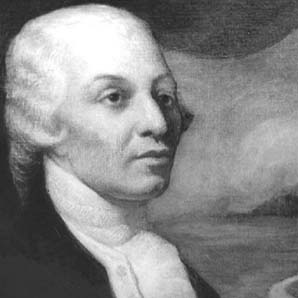 A financial broker who helped fund the Continentals, Haym Solomon, an Ashkenazi Jew from Poland, is the most famous Jew associated with the American War of Independence. From the number of congregations in existence at the time of the war, Solomon must have been one of many Jews in America. The goals of the Congress appealed to most Jews because they’d been persecuted for centuries elsewhere in the world.
A financial broker who helped fund the Continentals, Haym Solomon, an Ashkenazi Jew from Poland, is the most famous Jew associated with the American War of Independence. From the number of congregations in existence at the time of the war, Solomon must have been one of many Jews in America. The goals of the Congress appealed to most Jews because they’d been persecuted for centuries elsewhere in the world.
Muslims
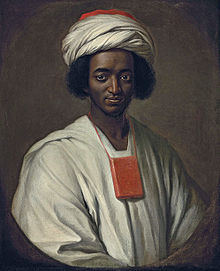 On occasion, Africans captured for the slave trade proved to be literate Muslims who could transcribe the Quran from memory. Here are two examples provided by Daniel Dillard, a doctoral candidate in religion at Florida State University:
On occasion, Africans captured for the slave trade proved to be literate Muslims who could transcribe the Quran from memory. Here are two examples provided by Daniel Dillard, a doctoral candidate in religion at Florida State University:
Job Ben Solomon Jallo (1701–1773), also known as Ayuba Suleiman Diallo, a Senegalese Muslim of aristocratic birth enslaved for a brief period in Maryland, composed three separate copies of the Quran solely from memory. Abdulrahman Ibrahim Ibn Sori (1762–1829), also known as Abd ar-Rahman, the famous West African prince enslaved for 40 years in Mississippi, occasionally delighted audiences by telling them he was writing out ‘‘The Lord’s Prayer’’ in Arabic, when in actuality he had transcribed the first sura, or chapter, of the Quran, known as the fatiha.
George Sale translated the Quran into English, advertised it in American newspapers, and made it available in bookshops. As a result, a number of Americans during the Revolution owned copies of the Quran and were familiar with the Muslim religion.
Thomas Jefferson studied the Quran. It may have influenced his work on the Declaration of Independence.
Other Non-Christians
Native Americans engaged in various spiritual practices—monotheistic, polytheistic, henotheistic, animistic, or a combination of those. Indentured servants from the British Isles or Germany who were transported or took passage to better themselves brought with them folk religions in addition to Christianity. Captured Africans who weren’t Muslim contributed varied polytheistic religions to the mix, and those slaves who embraced Christianity in America didn’t always abandon their native religion.
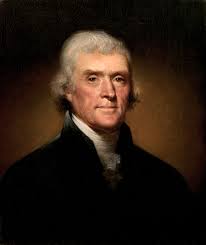 A number of the nation’s founders left written records showing that they were comfortable with and supportive of faiths other than Christianity. Plus they’d seen the problems caused by state religions in other parts of the world. After the Treaty of Paris, for the good of the new country, they steered the development of the United States of America toward a government that would tolerate a variety of religions. Here are Thomas Jefferson’s famous words about religion and government:
A number of the nation’s founders left written records showing that they were comfortable with and supportive of faiths other than Christianity. Plus they’d seen the problems caused by state religions in other parts of the world. After the Treaty of Paris, for the good of the new country, they steered the development of the United States of America toward a government that would tolerate a variety of religions. Here are Thomas Jefferson’s famous words about religion and government:
Believing with you that religion is a matter which lies solely between Man and his God, that he owes account to none other for his faith or his worship, that the legitimate powers of government reach actions only, and not opinions, I contemplate with sovereign reverence that act of the whole American people which declared that their legislature should ‘make no law respecting an establishment of religion, or prohibiting the free exercise thereof’ thus building a wall of separation between Church and State.
In America, religion-based hate crimes undermine the goal of religious diversity that the country’s founders sought. Such crimes destabilize the freedoms we enjoy today—freedoms that thousands of people purchased for us with their lives from 1775–1783 and in subsequent wars.
What do you think about the position of our founders on religious diversity? In what ways would America be different today had their position been less tolerant?
The 2014 “Week-long Fourth of July” wouldn’t have been possible without you or my talented guests: Lars D.H. Hedbor, Helena Finnegan, Dr. Christine Swager, David Neilan, Tim Osner, Sheila Ingle, and Jack Parker. What worlds can they open for you? Browse back through the posts. Look for their works. Then comment here on something you learned this week that made history relevant to you. Thanks for stopping by!
(Thanks to James Stewart, Thad Weaver, William Myers, and Martha Katz-Hyman for input on this essay.)
*****
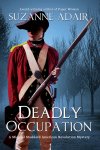 …
… 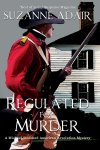 …
… 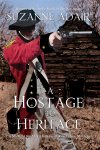
Contribute a legitimate comment on this post by today at 6 p.m. ET to be entered in a drawing to win a copy of one of my books, the winner’s choice of title and format (trade paperback or ebook). Delivery is available worldwide. Make sure you include your email address. I’ll publish the names of all drawing winners on my blog the week of 14 July.
**********
Did you like what you read? Learn about downloads, discounts, and special offers from Relevant History authors and Suzanne Adair. Subscribe to Suzanne’s free newsletter.

What a wonderful week of really useful and helpful information, thanks very much for sharing with us! This has just been marvelous! I’ve learned so very much!
Thank you for stopping by my blog, Lynn. I’m glad you learned from these essays.
I admire your even-handedness in presenting this information as once more in our country we need the reminder that this was NOT founded as a specifically Christian nation 😉
I’ll be looking for the Frazer book for more information.
Thanks for a great blog hop with wonderful guests and I’m looking forward to your next book (non-historical, right?).
Linda, I appreciate your comments and thoughts. On Amazon, Frazer’s book currently has 14 five-star reviews and 1 two-star review. I suspect you’d enjoy reading the comments on the two-star review; they’re an intelligent and civilized rebuttal and defense of the views of the two-star reviewer. It shows how deeply ingrained the myth of “Christian America” is.
I’m so glad you enjoyed the blog hop. I hope you checked out a few of the other blogs involved.
And yes, although I expect to write the first draft of Michael Stoddard #3 this summer, my next book released will most likely be book #1 of my new science fiction series.
I was asked to speak at a local synagogue and to tie my topic, early colonial history, to the Jewish faith! I came up with a letter from George Washington to the synagogue in Newport, RI assuring the Jewish people that they had the right to worship as they chose. The letter raised the man even higher in my estimation.
Thanks for stopping by, Marilyn. Letters like that one from George Washington show religious tolerance from the Founding Fathers. Those guys were way ahead of their time. But this is another element about the Revolution that isn’t taught much in high schools, so many Americans don’t get the toleration attitude.
Jefferson could have been a little more helpful in his contention that making no law respecting the establishment of religion nor prohibiting the free exercise thereof constituted a separation of church and state. We have been debating exactly what that means since 1787 without coming to any real consensus.
Would it have killed the delegates to the Constitutional Convention to have maybe defined more clearly who or what was entitled to free exercise of faith? When a few individuals form a group does it cause them to lose that freedom since the group is a separate entity?
Half the delegates to the Convention had been trained as lawyers. They should have known that broadly worded laws are subject to the most litigation. Oh, wait. Litigation was their bread and butter. Silly me.
Lynn, do you get the feeling that sometimes Jefferson had to settle for people not understanding him? The guy was a genius. Most people weren’t going to “get it,” no matter how hard he tried.
As for the question of who or what was entitled to free exercise of faith, I bet the delegates intentionally didn’t try to lock down the definition because they’d studied world history and knew how easily abuses of “freedom” can happen.
No doubt they suspected how much work they were guaranteeing for themselves and future attorneys. 😉
Thank you, Suzanne and her friends/colleagues, for a bit of history revisited. I know we take much for granted and think everything we learned in school was not only truth, but the only truth. Even today, in the deep south, there’s an effort to bury much of our true history and teach only the white, Anglo-Saxon version of it.
You have my email address, I believe, as I cannot leave a comment without supplying it. If that’s not accurate, would you message me via my FB page instead? Or I’m tracking follow-up comments to this and can reach back out.
Thanks.
Thank you, Claire, for checking out the “Week-long Fourth of July.” Yes, American schools teach varying degrees of propaganda. In the southern states, a lot of teachers spend a huge amount of time on the Civil War and allocate no more than a week to the Revolutionary War, go figure. Occasionally students will get an enlightened history teacher who works around the “curriculum” and activates students’ curiosity about real history. But researching history for my series has been a real shocker for me, as I’m sure it’s a shocker for anyone who was taught balderdash like “Paul Revere completed his ride” and “Yorktown was the only battle site of significance in the southern theater.”
Thank you, Suzanne, for such an even-handed look at the history of the founders. It has become such a hotly-disputed issue as different factions of the country try to re-write history. I appreciate your thoughtful handling of the subject.
You’re welcome, Jenni. I imagine the information about the Muslims in this essay would make some Americans nervous. It probably also disturbs some Americans to learn that certain inhabitants of the country practiced Christianity plus another religion during the Revolution. Yet people have done that throughout history.
Absent religious tolerance, there could not have been a nation. Maryland was a Catholic refuge, amid various splinters of Protestant sects. Had the religious wars of Europe carried over, no cohesion would have been possible.
Huzzah, Liz! Absent religious tolerance, America would have fallen apart long ago. A Crusade, anyone?
Every day as I watch and read events in various parts of the world, where violence and hatred motivated by religious intolerance continues to escalate, I deeply appreciate the foresight of the Establishment Clause of the First Amendment, which guarantees the separation of government and religion. I am free to practice, or not practice, a religion of my choosing.
Good for you, James. You totally get it. There’s a whole generation (or two) in America that takes for granted how relatively safe we are from that religion-motivated violence and hatred. Safe, yes, as long as we keep government and religion separate.
I am not so sure that the acceptance of religious diversity on the national level was a compromise some states made. At least one state included in its constitution two stipulations that definitely are not contributory to religious diversity. Regarding voting qualifications one state stipulated, “The qualification of electors shall be that every free white man, and no other person, who acknowledges the being of a God, and believes in a future state of rewards and punishments
A second stipulation in the SC Constitution of 1778, regarding office holders, clearly segregated “papists” from other Christians, “No person shall be eligible to sit in the house of representatives unless he be of the Protestant religion.”
Maryland had similar voting regulations, at least in the early 18th century. Maryland Puritans defeated the proprietary government (Catholic-centered) in 1689. In 1704 a law was passed preventing Catholics from holding public office. Around the time of the American Revolution religious toleration was restored. Ironically, the only Catholic signer of the Declaration of Independence was Charles Carroll of Maryland.
Hi David. Yes, such examples of intolerance happen when local, state, and national governments interpret and enforce the same law differently. (Nasty use of a loophole, if you ask me.) Makes me wonder what similar laws are still on the books in states that didn’t vote to compromise.
From what I’ve read, at the time of the Revolution, Catholics were still walking on thin ice.
The information about the presence and awareness of Islam in the Colonies struck me as particularly interesting – thank you for that!
It’s worth noting, too, that one of the things that made the Intolerable Acts of 1774 so intolerable was the recognition of Catholicism as the established church of the British-controlled Province of Quebec.
While there was some anti-Catholic feeling among the populace, I can’t help but wonder whether this Act of Parliament may have directly shaped the First Amendment to the Constitution, as well.
Lars, I knew there were Muslims in America during the Revolution, abducted for the slave trade, but until I researched their presence more deeply, I didn’t realize that some of the men snatched were high-profile and literate.
The Founding Fathers knew what they were doing when they instituted separation of church and state. Both work better separately than intertwined. Because our nation is so diverse, which is its strength, having a state religion would be impractical as well as unfair. We have the right to practice whatever religion we choose, or none at all, but we don’t have the right to impose our religious beliefs on others. What use would it have, anyway, if people were not following it out of genuine faith?
Ah, Tracy, that’s a big can of worms. Throughout history, people have followed religions without having genuine faith. They’ve done so when it helped them prosper or even when it helped them stay alive. If the circumstances are right, people will follow more than one religion at the same time or blend religions into a hybrid faith.
From the journals of Woodmason and Asbury it appears that religion was not high on the list of survival needs in the back country.
Hi George! Indeed, I considered mentioning some of Woodmason’s observations in South Carolina (poor shocked fellow) as well as Asbury’s sermons in North Carolina taverns but didn’t have room in this essay. Woodmason and Asbury might be another entire essay, though.
Malala Yousafzai on religious intolerance and courage:
http://www.upworthy.com/watch-this-incredible-young-woman-render-jon-stewart-speechless
Much as some would like to posit a faith-based American Revolution, I would argue that the events of 1775-83 played out in a trough of American interest in organized religion. The draconian-disciplinary regimes of the first New England settlements, as relayed by David Hackett Fischer, were subsumed by a generation more attracted to looser structures. The Great Awakening of the early 18th century reversed that direction to some extent, but a reading of “The Minutemen and Their World” details a Concord, Mass. community in which the local congregational church had degenerated into a political football – and an establishment bastion in an anti-establishment era. The tenor of the period strikes me as one in which mainstream religion commanded nominal allegiance but little genuine enthusiasm. No trend is absolute, however, and certainly the targeting of high-end Anglicanism by militant Protestantism found residual
form in the rising of the over-mountain men prlor to the King’s Mountain battle in SC…though more as an entry point than issue of contention. Nonetheless, stronger roots of modern American Protestantism are better sought in the post-War of 1812 Second Great Awakening, marked by a spate of religious college foundings and mega-church construction…and predictably, we read much more of increased revival activity in the annals of the Union and Confederate hosts.- Tate Jones, Executive Directir, Rocky Mountain Museum of Military History, Fort Missoula, Mt.
Thanks for stopping by, Tate.
The clergyman Charles Woodmason would agree heartily with you. He was unable to put the fear of God into the hearts of folks during his travels into the Carolina backcountry. People cohabited and had children without the benefit of matrimony — although they allowed him to officiate at their after-the-fact weddings — and nubile young women sorely tested his restraint by lacing their bodices in a way to show plenty of cleavage. In Hillsborough, North Carolina, clergyman Francis Asbury found that the best way to pack the house for his sermons was to hold them in taverns — where I doubt they offered grape juice during Communion.